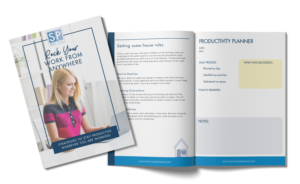
Whether it is at work or at home, we all have our own organizing style. Some of it is based on personal preference and some tied to routines or habits that work best for us. When we live and work with others, we need to consider their organizing style, preferences and needs, as well as voice our own. We want to develop organization, systems and structure that work for everyone. You have choices!
Organizing styles are not one size fits all
It can be challenging for an organized person to function in an unorganized (or differently organized) world. When you live or work with someone that has a different organizing style, it comes down to compromise. What can each side adapt to that fits the style of the other? This can be a partner, child or roommate, or coworkers that don’t share the same organizing style or habits.
Here are a few examples of different organizing styles and how you can adapt to each:
Everything put away vs. everything out
At home, if one person likes to “dump and run” rather than dealing with their items, provide a particular space for them to dump into. Give them a drawer in the kitchen or mudroom, a tray on the kitchen counter, or a basket inside the front door. By providing a container or well-defined but limited space, they can dump to their heart’s content but ONLY into that spot. The boundaries of a container will help things look organized and tidy.
In a work setting, you don’t need to share the same organizing style as the person working next to you. The goal is just knowing where you can find what you need when you need it. If your neighbor likes to keep everything put away and you like things left out on your desk so you can see them, that’s ok. As long as you can find what you need, when you need it , and you’re able to focus on your priorities, you are organized.
Organizing in the moment vs. at the end of the day (or even week!)
Are you the type of person who reads and responds to each Email as it comes in, or do you save it all up to process periodically? Which is the system that works best for you and makes you the most productive? This is a very individual thing, but there are also organizing situations that require compromises. When you live or work in a shared space with another person, decisions should be made together regarding certain spaces. For example, a kitchen island or other public space will be tidied at the end of each day, but things that you can close a door or drawer on can be dealt with once a week.
Resist the urge to organize out from under someone
It might look like your partner, family member, roommate or coworker has just dropped a random item on the counter or desktop. However, they might have done it consciously and with a plan for its later use. Before you toss or even move it, ask. Another strategy could be to collect all the random bits that belong to another into a single container for the other person to go through.
Working from home also presents a challenge, when common spaces are being used for work or virtual learning. In this case, keeping a tidy shared space is essential for maximum productivity. Its hard to relax when there are objects strewn about where they shouldn’t be. When your home doubles as your workspace, it can be even more distracting. Communicate your needs. Ask for help or buy-in from the others using the space. Compromise so that everyone involved feels heard, and considered.
Continue to talk about purging vs keeping
Consider the value in donating, selling or passing things along that are of no use anymore. Take a hard look at what items in your shared space are being unnecessarily kept. Clutter at home or at work can serve as a source of stress, distraction, and cost time and money. Being surrounded by clutter affects you. It makes a difference emotionally, physically and energetically. It impacts your ability to get work done, find what you need when you need it and focus on your priorities.
When you share space with others who tolerate more or less “stuff” in the space than you might, this might be an ongoing conversation, or a periodic topic to revisit. Organizing is a process, not an event, and our situation, as well as the stuff around us changes. Ensure that the way a space is organized works for all involved. Be willing to consider each other’s style, preferences and needs. Keep the communication open and regular.
At the end of the day, you don’t need to share the same organizing style to have an organized space. Last week we talked about the power of choice in terms of how you manage your time and tasks. The same principles can be applied to organizing styles. If you’d like to learn more, schedule your initial consultation call with Simply Placed today!






